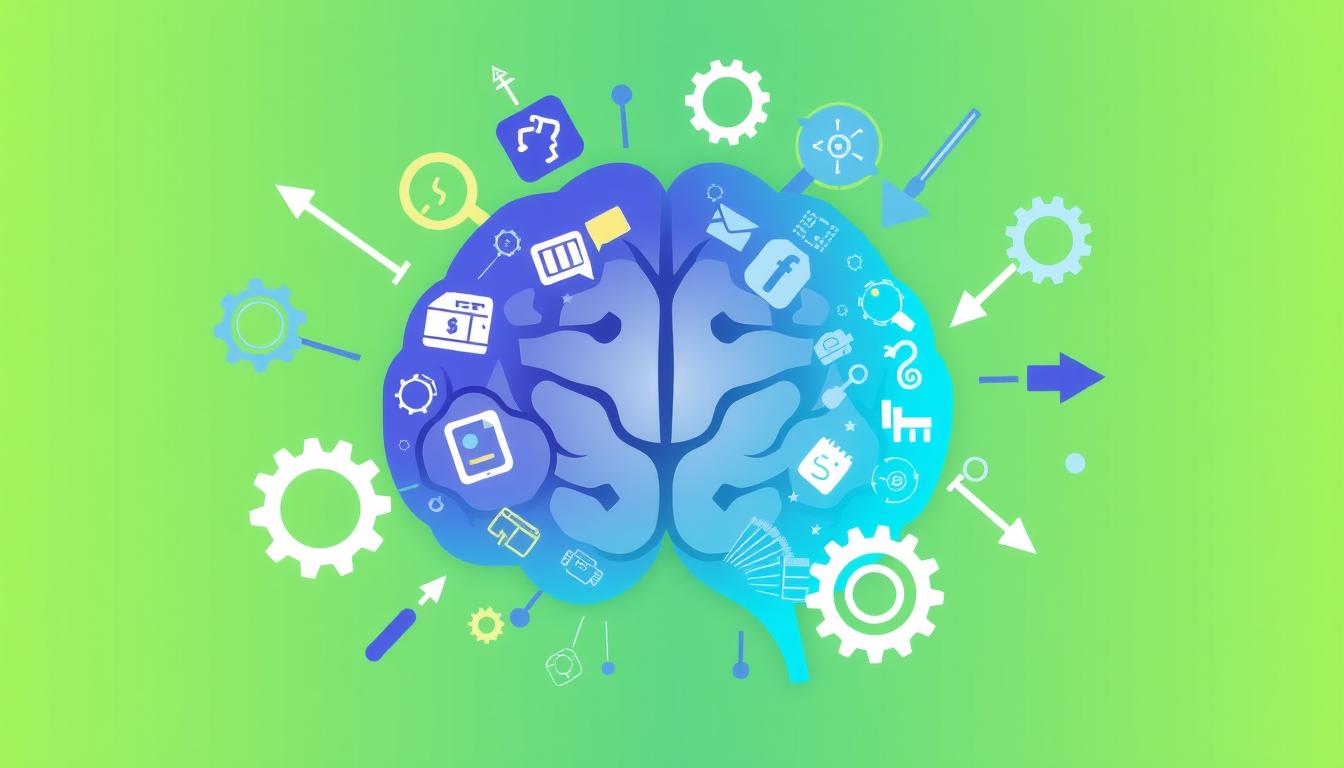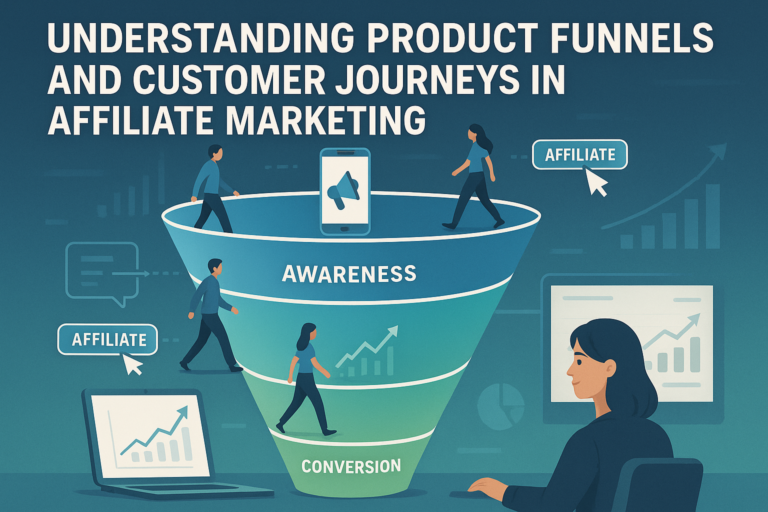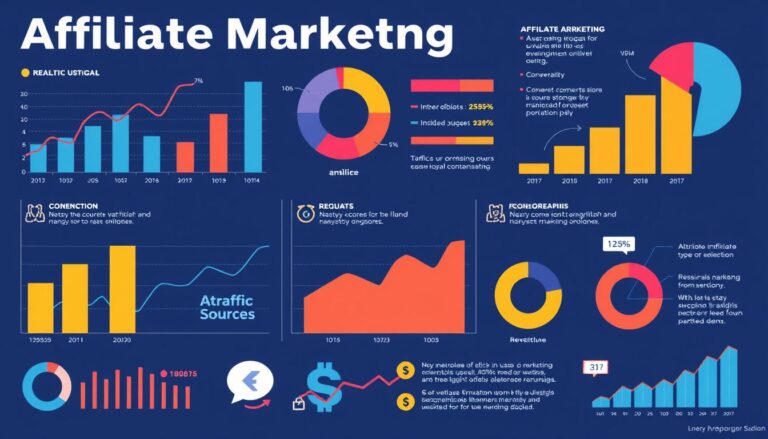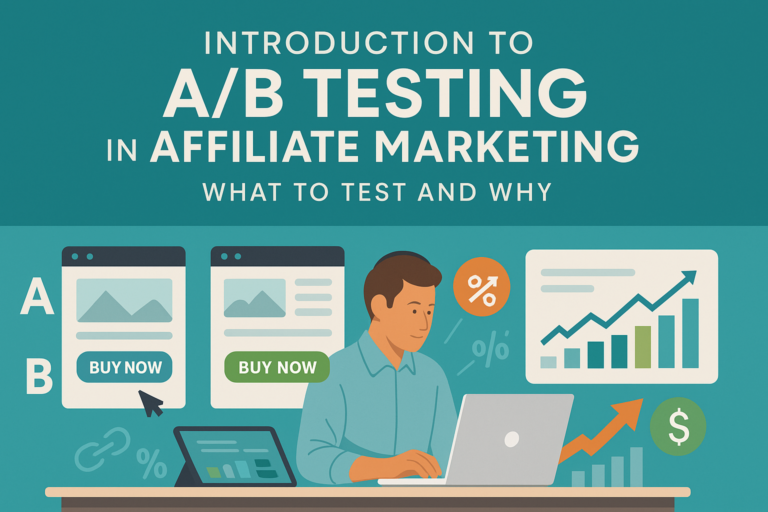The Psychology of Affiliate Sales: Understanding Your Audience to Boost Conversions
In the fast-paced world of digital marketing, affiliate sales success depends on knowing your audience well. We use sales psychology and consumer behavior to understand how people think and buy. This helps us make affiliate marketing strategies that really connect with our audience, leading to more sales1.
The journey to making a purchase is complex, with five stages: identifying a problem, searching for info, evaluating options, making a choice, and acting after the buy1. By understanding these stages and consumer mindset in affiliate purchases, we can make buying easy and trustworthy. This builds loyalty and increases our sales.
Deeper into the psychology of affiliate sales, we see many factors at play. These include emotions, social proof, and the appeal of scarcity. Using these psychological triggers for conversions, we can make our marketing messages strong, our user experiences engaging, and our customer relationships lasting. These are all key for boosting affiliate sales through insights.
To see how audience insights fit into a wider affiliate strategy, check out Affiliate Marketing Intermediate Level: Taking Your Business to the Next Stage.
Key Takeaways:
- Affiliate marketing strategies success relies on understanding consumer behavior and social psychology
- Mapping the customer journey is crucial for creating impactful campaigns
- Leveraging emotional triggers, social proof, and scarcity tactics can boost conversions
- Establishing credibility and trust through the authority principle is essential
- Conversion optimization and building long-term relationships are key to sustained growth
Understanding Consumer Behavior in Digital Marketing
Understanding audience behavior in affiliate marketing is key to making effective digital marketing strategies. We need to look into the decision-making process to buy things. This includes what makes them feel certain ways and the path they take to make a purchase3.
The Role of Emotional Triggers in Purchase Decisions
Emotions greatly affect how people behave when buying things. Things like fear of missing out (FOMO) and the excitement of new things can really influence them4. Knowing how emotions like fear and joy can push people to act helps us make ads that really connect and get results.
Mapping the Customer Journey
Today, people go through many steps from first hearing about a product to buying it and staying loyal3. By tracing this journey, we can find important moments to connect with them. This includes everything from social media to after they’ve bought something.
Key Motivational Factors
Understanding what motivates people is at the core of knowing how they behave. It’s about what drives them, whether it’s personal satisfaction or wanting to impress others3. By matching our marketing with these motivations, we can make offers that really speak to our audience.
By diving into the world of digital consumer behavior, we can gain valuable insights. This helps us improve our marketing and grow in a lasting way. By understanding emotional triggers, mapping the customer journey, and knowing what motivates people, we can truly connect with them and succeed.
The Power of Social Proof and Collective Influence
In today’s digital world, social proof is a key factor in how we make choices. It’s about following what others do and say.In affiliate marketing, using behavioral targeting for affiliates and social proof is key to success5. Companies use things like videos, blog posts, and reviews to show how products work and build trust5.
When famous people or experts endorse a product, it makes the company look better. This can attract more people5. Sharing stories of happy customers and using content from users can show how good a product is5. Working with influencers or celebrities can also help a brand get noticed by more people5.
Social proof works because it taps into the idea that the crowd is usually right6. Things like testimonials and social media likes make people feel more confident in buying6. Companies that use different types of social proof can stand out and do better in marketing6.

Understanding social proof and using it can help businesses gain trust and grow. It can also lead to more successful marketing campaigns56.
The Psychology of Affiliate Sales
Understanding affiliate sales means knowing how people make decisions and using psychology to get them to buy. By understanding human behavior, marketers can make better ads and earn the trust of their audience.
Understanding Decision-Making Processes
Buying decisions are shaped by many things like how we see things, learn, and what others do. Using these insights, marketers can make their ads more effective and engaging.
Psychological Triggers for Conversion
Good affiliate marketing uses psychology to get people to act. Creating a sense of urgency, using influencers, and showing what you might lose can all help. Knowing these biases is key to success.
Building Trust Through Authority
In affiliate marketing, trust is everything. Using experts in videos or Q&A sessions can make your brand seem more trustworthy. Sharing success stories and testimonials also helps build trust and credibility.
By understanding persuasion tactics in affiliate marketing and using affiliate sales optimization techniques, marketers can create campaigns that really connect with people. Mixing psychology with marketing methodes can lead to big wins in affiliate marketing.
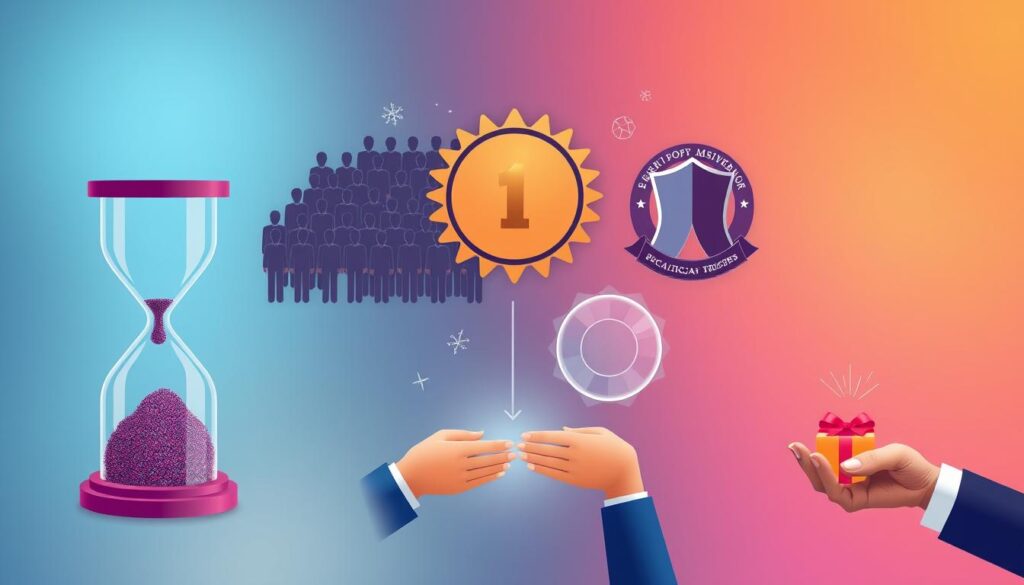
“Combining psychology and traditional marketing methods can increase the chances of influencing customers in profound ways, leading to more successful affiliate marketing campaigns.”7
Leveraging Scarcity and FOMO in Affiliate Marketing
Scarcity and Fear of Missing Out (FOMO) are powerful tools in affiliate marketing. They can make people buy things faster. By making things seem urgent and exclusive, marketers can tap into what people want8.
One good way is to offer deals that are only available for a short time. Kylie Cosmetics made $900 million, Starbucks got lots of Instagram shares, and Tesla got 500,000 pre-orders8. Countdown timers and low-stock alerts make things feel more urgent, like Amazon’s Lightning Deals and Zulily’s sales9.
Being exclusive can also work well. It makes people want to belong and feel special. Supreme’s limited releases and Booking.com’s limited rooms are great examples89.
Using scarcity and FOMO well can really help affiliate marketers. By understanding these strategies and using them right, brands can make people feel like they need to act fast910.
| Scarcity Tactic | Example | Impact |
|---|---|---|
| Limited-Quantity Offers | Kylie Cosmetics’ product releases | $900 million in revenue8 |
| Limited-Time Offers | Starbucks’ Unicorn Frappuccino | 150,000+ user-generated shares on Instagram8 |
| Countdown Timers | Amazon’s Lightning Deals | Increased urgency and conversions9 |
| Low-Stock Notifications | Booking.com’s room availability | Prompts quicker purchases9 |
| Exclusivity and Membership | Supreme’s limited-edition releases | Fostered exclusivity and loyalty9 |
Creating Persuasive Marketing Messages
In the world of affiliate sales, making great marketing messages is key. Good persuasive marketing uses psychology to guide buyers. It helps them move from interest to action11.
Crafting Compelling Call-to-Actions
Creating strong call-to-actions (CTAs) is vital to turn visitors into buyers. Knowing what your audience wants helps you make CTAs that speak to them. Using clear language and showing how your product solves problems can help a lot11.
Using Psychological Pricing Strategies
Psychological pricing tricks, like charm pricing or bundling, can make products seem more valuable. By framing prices in a certain way, you can influence what people think is a good deal. This can lead to more sales12. Also, using scarcity, like limited-time offers, can create a rush to buy13.
Storytelling Techniques for Connection
Storytelling is a strong tool in marketing, as it builds emotional bonds with the audience. Telling stories that speak to your audience makes your messages stick in their minds12. Adding social proof, like customer reviews or influencer endorsements, can make your stories even more convincing13.
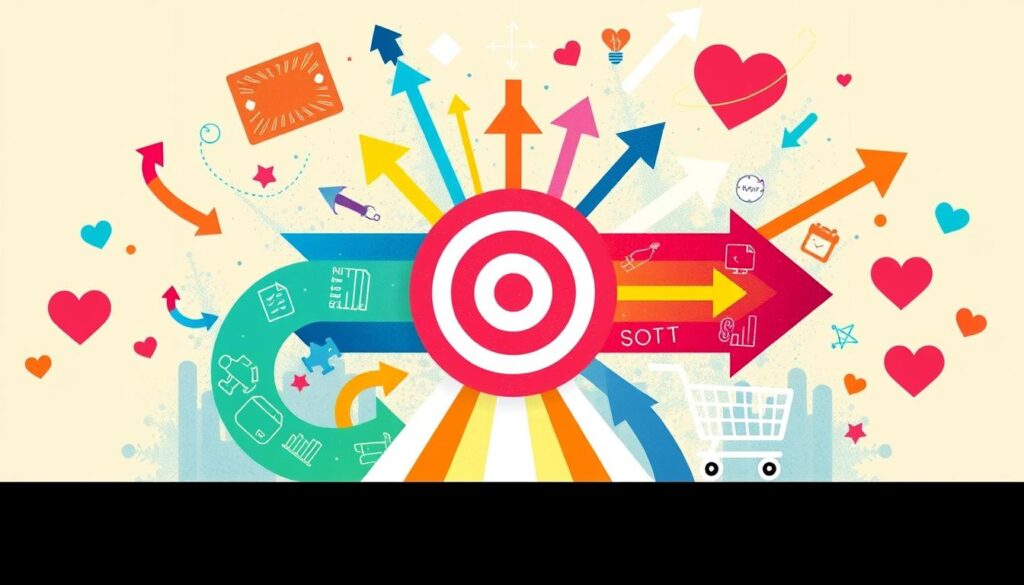
The psychology of affiliate sales is complex but rewarding. By understanding what drives people to buy, you can make marketing that really connects. This can lead to more sales and happy customers111312.
Understanding Buyer Motivation and Intent
Exploring the psychology of affiliate sales shows us the importance of knowing what drives buyers. People make choices based on both logic and feelings14. By grasping these motivations, we can improve our marketing to reach and engage our audience better.
Buyer intent falls into three main types: informational, navigational, and transactional14. We need to tailor our approach to meet these needs. Using psychological tricks like the Endowment Effect and Social Proof can make our marketing more appealing15.
Also, matching our messages with basic human desires like wealth, health, and love can boost sales14. Knowing what emotionally drives people to buy helps us create better marketing campaigns.
The secret to better affiliate sales is understanding and meeting our audience’s varied needs14. By using psychological knowledge in our marketing, we can stand out and build strong customer bonds.
“Successful marketing is not about you, it’s about them. It’s about understanding their wants, needs, and motivations.” – Unknown
Optimizing the Customer Experience Through Psychology
In today’s digital world, making the customer experience smooth and engaging is key. It helps drive sales and builds strong client relationships. By using cognitive and behavioral science, we can make the customer journey better. This turns casual visitors into loyal customers. Let’s look at how psychology affects website design, user experience, and sales.
Website Design Psychology
The look and feel of a website greatly affects how users behave. Color psychology, for example, can make people feel certain ways and influence their buying decisions. Research shows that 85% of shoppers choose products based on color16. Using warm, bright colors can make people feel a sense of urgency, which is great for selling food products17.
Too many choices can confuse and scare off customers. This can lead to them leaving without buying. By offering fewer options and making choices easier, we can improve the user experience and boost sales16.
User Experience Optimization
Improving the user experience is more than just making a website look good. It’s about the whole journey from first visit to final purchase. Using social proof, like customer reviews, can build trust. In fact, 87% of people trust online reviews as much as personal recommendations16. Adding high-quality images and videos can also increase engagement by 48%, making the experience better16.
Understanding how people behave can help us create better messages and products. For example, people are 70% more likely to remember the main idea of a message, not the details. This shows the importance of clear messaging in affiliate marketing16. Introducing a less appealing option can also increase sales of a more expensive product by 30%, showing the power of the decoy effect16.
Converting Browsers to Buyers
The main goal is to turn visitors into loyal customers. By using psychology, like scarcity and loss aversion, we can create a sense of urgency and curiosity. This drives people to buy16. Studies show that 75% of shoppers make a purchase because of a sense of urgency, like limited-time offers16. Also, strategies that create curiosity can increase click-through rates by 15%, showing how to engage consumers16.
By understanding consumer psychology and applying these principles, we can create a digital presence that attracts and converts our target audience1718.
Building Long-Term Customer Relationships
In the world of affiliate marketing, success comes from strong, lasting customer relationships. Focusing on customer management, loyalty programs, and repeat buys helps build a loyal base. This base brings in steady revenue through smart marketing strategies19.
Personalized experiences are key to loyalty. Targeted loyalty programs reward repeat buys and referrals, making customers feel special. This encourages them to keep coming back to the brand20. Following up after a purchase, asking for feedback, and solving problems builds trust and strengthens these bonds.
Valuing customer lifetime over single sales is a smart move. It leads to more profitable and lasting affiliate partnerships19. By always delivering value and ensuring a positive experience, businesses can boost repeat buys. This helps build strong, lasting relationships with both affiliates and customers.
| Loyalty Program Strategies | Impact on Customer Relationships |
|---|---|
| Referral Rewards | Encourages word-of-mouth marketing and builds a community of loyal customers20. |
| Tiered Commissions | Incentivizes affiliates to drive more sales and maintain long-term partnerships19. |
| Personalized Offers | Fosters a sense of value and appreciation, leading to increased customer loyalty20. |
By understanding customer psychology, businesses can maximize their affiliate marketing efforts. This leads to lasting growth and profit192021.
“Building a community around your brand encourages word-of-mouth referrals.” – Dan Close
Conclusion
The world of affiliate sales is full of complex interactions. It involves how people behave, emotional triggers, and smart marketing. By using psychology, we can make our affiliate marketing better, get more sales, and keep customers coming back22.
Things like social proof, scarcity, and emotional content really help with sales and keeping customers22. Also, working with influencers can boost sales by 22% in some fields22.
Staying up-to-date with what consumers want is crucial for success in affiliate marketing23. Knowing about color, scarcity, and social proof can make our marketing more effective23. This way, we can make our customers’ experience better, leading to more sales and loyal fans24.
As we go forward, keeping up with new research and methods is key. By always learning more about affiliate marketing psychology, conversion optimization, and consumer behavior insights, we can stay ahead in this fast-changing field24.
Source Links
- https://medium.com/@vikme123/the-psychology-of-affiliate-marketing-how-consumer-behavior-influences-conversions-3cfc42a325e7 – The Psychology of Affiliate Marketing: How Consumer Behavior Influences Conversions
- https://medium.com/@bottomlineamb/how-to-skyrocket-your-affiliate-sales-in-5-steps-using-psychology-0fab4d00ccfa – How to Skyrocket Your Affiliate Sales in 5 Steps Using Psychology
- https://www.advertisepurple.com/the-psychology-of-affiliate-marketing/ – The Psychology of Affiliate Marketing – Advertise Purple
- https://www.linkedin.com/pulse/exploring-psychological-triggers-affiliate-marketing-michael-weare-1hove – Exploring the Psychological Triggers in Affiliate Marketing
- https://trustmary.com/social-proof/ – The Definitive Guide for Understanding the Power of Social Proof – Trustmary
- https://seowind.io/docs/social-proof-harness-the-power-of-influence/ – Social Proof: Harness the Power of Influence
- https://affiliatemarketeronline.com/the-science-of-influence-how-to-use-psychology-in-affiliate-marketing/ – The Science Of Influence: How To Use Psychology In Affiliate Marketing – Affiliate Marketer Online
- https://www.crowdspring.com/blog/scarcity-marketing/ – How Your Business Can Use Scarcity Marketing To Increase Sales – crowdspring Blog
- https://wisernotify.com/blog/scarcity-marketing-tactics/ – Latest Scarcity Marketing Strategy to Raise Sell in 2024
- https://bdow.com/stories/scarcity-marketing/ – 9 Scarcity Marketing Tactics (Proven Methods Inside) – BDOW! (formerly Sumo)
- https://www.stanventures.com/blog/persuasion-marketing/ – Power of Persuasion in Marketing to Drive More Leads
- https://www.freedomtoascend.com/sales/sales-psychology/the-power-of-persuasion-psychological-techniques-for-sales-professionals/ – The Power of Persuasion: Psychological Techniques for Sales Professionals – Freedom to Ascend
- https://blog.monadlead.com/article/the-psychology-of-affiliate-marketing–how-to-influence-purchasing-decisions/ – The Psychology of Affiliate Marketing: How to Influence Purchasing Decisions
- https://www.evolvbam.com/post/unlocking-the-secrets-of-buyer-psychology-a-comprehensive-guide – Unlocking the Secrets of Buyer Psychology
- https://getwpfunnels.com/buyer-psychology/ – Understanding Buyer Psychology To Optimize Marketing Efforts
- https://www.advertisepurple.com/9-psychology-principles/ – 9 Psychology Principles To Use In Affiliate Marketing – Advertise Purple
- https://www.postaffiliatepro.com/blog/10-psychological-mistakes-affiliate-marketing/ – 10 psychological principles to improve affiliate marketing
- https://www.convertmate.io/blog/the-simple-science-of-customer-retention-psychology – The Simple Science of Customer Retention Psychology – ConvertMate
- https://www.konnecto.com/post/best-practices-for-affiliate-program-success-part-1 – Launch & Grow Your Affiliate Program: Essential Best Practices 2024
- https://www.invitereferrals.com/blog/referral-goldmine-strategies/ – Cultivating Long-Term Customer Relationships with Referral Goldmine Strategies
- https://fastercapital.com/content/Affiliate-marketing-programs–Customer-Acquisition–Customer-Acquisition-Techniques-for-Affiliate-Marketers.html – Affiliate marketing programs: Customer Acquisition: Customer Acquisition Techniques for Affiliate Marketers – FasterCapital
- https://blog.goaffpro.com/the-role-of-psychology-in-creating-successful-affiliate-marketing-campaigns/ – The Role of Psychology in Affiliate Marketing
- https://www.nidacademy.org/the-psychology-behind-affiliate-marketing-2024/ – The Psychology Behind Affiliate Marketing 2024
- https://mailshake.com/blog/psychology-of-sales/ – The Psychology of Sales: How to Study Human Behavior to Grow Revenue

